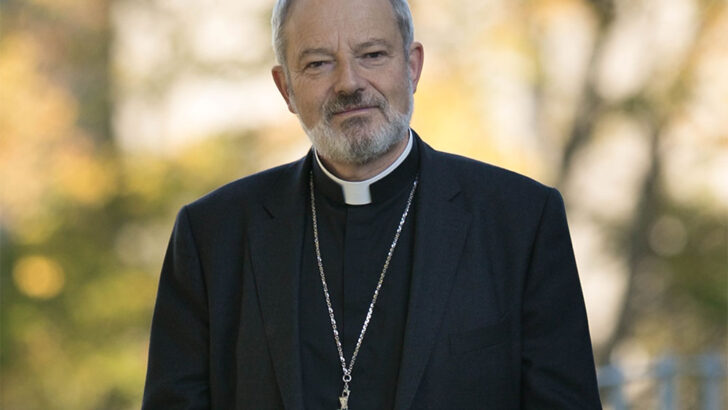We don’t like to talk too much about death. It’s the ultimate elephant in the room – inevitable and ignored for as long as possible, while we use euphemism to whistle past the graveyard.
On The Moral Maze (BBC Radio 4, Wednesday), many of the issues surrounding death were literally interrogated as the panel quizzed ‘witnesses,’ guests that had interesting things to say on the matter. I learned a new concept – ‘grief tech’ where artificial intelligence (AI) can create the illusion that you are still conversing with the deceased. Much was said about the body and what happens to it after death and why or whether we should respect it. Of course, for Christians, the body is not just a disposable “husk,” as one contributor put it, but inherently wedded to the person. In that respect I’d like to have heard more about the resurrection of the body and all it implies. I was glad to hear the presenter William Crawley referencing the Communion of Saints. Some thought you could do no more for loved ones when they were gone, and I thought the Christians present could have made more of what we can do for our deceased loved ones through prayer. The issue of what happens to relationships after death was of particular interest.
The use of rituals surrounding death was thoroughly discussed. Even journalist Ella Whelan, brought up Catholic in Ireland but no longer a person with faith, favoured the old traditions. Another contributor thought that the old traditions and rituals around death were of value because they were tried and tested. The overall question posed by the programme was ‘Do we need a final farewell?’ and there was a related question – ‘are funerals for the living or the dead?’
Faith
After that topic, some good news is needed. On Sunday Morning Live (BBC One), Charlotte Littlewood of the Institute for the Impact of Faith in Life outlined the surprising findings of new research into the religious views of young people. It seems in particular ‘Gen-Z’ is the most religious of all generations. For example, when asked if faith had a significant impact on their lives, the figure for 18-24 year olds was 69% compared to 65% for over 65s; for those searching for a deeper understanding of God, it was 38% for 18-24 year olds, 18% for 45-64 year olds and 20% for the over 65s; for those who find faith helps them find purpose in live, it was 72% for the 18-24 group, but only 47% for the over 65s. Three articulate young adults, a Hindu, a Christian and a Muslim gave a sense of the importance of faith to their lives. Green shoots then! The young Christian, Samuel, spoke of how his phone was an important factor in his journey to faith – finding people, new ideas, new connections online.
Podcast
Related to this is the growth of religious podcasting (radio by any other name!). The most recent edition of The Confession Box (Spotify etc) featured Garry O’Sullivan of this parish in conversation with Bishop Paul Dempsey, recently appointed Auxiliary for Dublin Diocese. The title and design are inspired, and the approx. half-hour length is ideal, a chance to tease out a topic at leisure with one guest. Bishop Dempsey was aware of the challenges facing the Church, has really enjoyed his parish work in Kildare and Leighlin and was now facing ‘enormous change’ in his new role. He was conscious of the ‘huge generosity’ of older priests and was particularly welcoming of the ‘new Irish’ and their contribution to parish life. He was upset at the negativity evident on the migration issue, while also accepting that welcoming communities needed appropriate facilities.
Legislation
Another Bishop who impressed this week was Bishop Kevin Doran of Elphin who, on last Monday’s Today with Claire Byrne (RTE Radio 1), ably proposed and defended the Church’s position on assisted suicide legislation. He did well under courteous but robust questioning. Claire Byrne put the choice and autonomy argument, but Bishop Doran proposed that autonomy wasn’t absolute and that there had to be concern for the impact of legislation on the common good. The experience of other countries suggested that what was introduced on narrow grounds eventually became broader even to the point of obligation. “People make choices,” he said, “but the proposed legislation involved ‘the active participation of health care professionals in taking the lives of the sick.”
The straight talking was welcome.
PICK OF THE WEEK
SONGS OF PRAISE
BBC ONE Sunday June 30, 1.15 pm
Katherine Jenkins is at RHS Chelsea Flower Show to explore a garden exhibited by St James’s Piccadilly, the first church to contribute a garden to this prestigious event.
FAITH AND LIFE
EWTN Monday July 1, 8 pm
Fr Joseph Mary of the Franciscan Friars talks about his previous work in a housing estate run by Irish gangs. Lessons he learned from his own teenage years helped him evangelise and improve the lives of others.
EUGENICS: SCIENCE’S GREATEST SCANDAL
BBC FOUR Tuesday July 2, 11.15 pm
Science journalist, Angela Saini, and disability rights activist, Adam Pearson, investigate how the legacy of eugenics continues to the present day.


 Brendan O’Regan
Brendan O’Regan Bishop Kevin Doran of Elphin
Bishop Kevin Doran of Elphin 